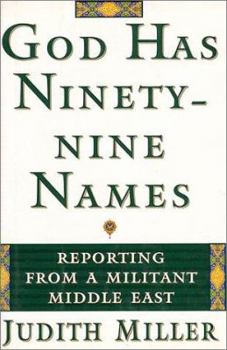God Has Ninety-Nine Names: Reporting from a Militant Middle East
Select Format
Select Condition 
Book Overview
A FIRST-HAND ACCOUNT OF THE STRUGGLE FOR POWER IN TODAY'S MIDDLE EAST God Has Ninety-Nine Names is a gripping, authoritative account of the epic battle between modernity and militant Islam that is is... This description may be from another edition of this product.
Format:Hardcover
Language:English
ISBN:0684809737
ISBN13:9780684809731
Release Date:May 1996
Publisher:Simon & Schuster
Length:574 Pages
Weight:2.00 lbs.
Dimensions:1.6" x 6.5" x 9.6"
Customer Reviews
4 ratings
Enlightening
Published by Thriftbooks.com User , 22 years ago
Judith Miller is one of few who dares to blame the plight of minorities in Arab lands on the pervasive bigotry, racism and violence of Arab society. For that she is to be commended, not scorned. Ironically, Miller joins Moslem writers whose treatment of taboo subjects have been considerably more harsh than hers. Beyond the Veil portrays the Prophet Mohammad as a ... addict because he had up to 12 wives at the same time. Naguib Mahfouz' The Children of Gebalawi shows Mohamad as someone who smokes Hashish, and Nawal Saadawi recently declared The Hajj (pilgrimage to Mecca, one of 5 pillars of Islam) a paganistic practice. Not to mention Salman Rushdi, whose Satanic Verses portrays the prophet as sexually perverted. How honest is Edward Said, on the other hand? When covering Islam in Moslem countries, Said suggests that journalists and commentators should avoid subjects embarrassing to Arabs and Moslems. That includes the treatment of Christians, Jews, Bahais, women and other members of oppressed or minority classes whose plight in the Arab world has long been neglected by western scholars. Said suggests that no Christian or Jew can legitimately criticize the Moslem world. That includes scholars like Bernard Lewis, Yael Bat Yeor (who grew up in Egypt) and Miller, a Jewish reporter for the New York Times. In effect, Said advocates a cover-up of Arab and Moslem atrocities. This can only perpetuate the suffering of those oppressed in Arab nations, including women. Miller sheds light on this arena. Said advocates a double standard. Which one is more honest? My vote's with Miller.
Shedding light
Published by Thriftbooks.com User , 22 years ago
Judith Miller is one of few who dares to blame the plight of minorities in Arab lands on the pervasive bigotry and racism of Arab society. For that she is to be commended, not scorned. Ironically, Miller joins Moslem writers whose treatment of taboo subjects have been considerably more harsh than hers. Beyond the Veil portrays the Prophet Mohammad as a sex addict because he had up to 12 wives at the same time. Naguib Mahfouz' The Children of Gebalawi shows Mohamad as someone who smokes Hashish, and Nawal Saadawi recently declared The Hajj (pilgrimage to Mecca, one of 5 pillars of Islam) a paganistic practice. Not to mention Salman Rushdi, whose Satanic Verses portrays the prophet as sexually perverted.How honest is Edward Said, on the other hand? When covering Islam in Moslem countries, Said suggests that journalists and commentators should avoid subjects embarrassing to Arabs and Moslems. That includes the treatment of Christians, Jews, Bahais, women and other members of oppressed or minority classes whose plight in the Arab world has long been neglected by western scholars. Said suggests that no Christian or Jew can legitimately criticize the Moslem world. That includes scholars like Bernard Lewis, Yael Bat Yeor (who grew up in Egypt) and Miller, a Jewish reporter for the New York Times. In effect, Said advocates covering up Arab and Moslem atrocities. This can only perpetuate the suffering of those oppressed in Arab nations, including women. Miller sheds light on this arena. Said advocates a double standard. Which one is more honest? My vote's with Miller.
A Fascinating Resource
Published by Thriftbooks.com User , 23 years ago
Anyone drawn to study history, culture or politics will find this book well worth the read.I was drawn by the sub-title, "Reporting from a Militant Middle East" because I've long felt the need to get some sort of understanding of the religious, social and political complexities to be found in the Middle East. This was the perfect book to meet that need. Miller writing style is understandable and approachable. Her commitment to detail is unwavering, and because of that, one walks away with the feeling of really having learned well what she had to teach from her 20 years of experience as a reporter in the Middle East. Finally, a single source to unravel the mysteries of so many separate and yet, connected, Islamic groups - some with influence throughout the Middle East, others that are very specific to certain cultures and countries.This book has made my list of Favorite Books of All Time.
A fascinating portrayal of life in the Middle East
Published by Thriftbooks.com User , 27 years ago
I found this text to be a truly fascinating read; a thorough country by country analysis of the social, political and religious climate of the Middle Eastern countries. There is much to learn here, not so much as a study of the good or evil (take your pick) of Islam but as a tremendously thorough study of the cultures of these countries and how those cultures and practices developed. This is as good a "history' text as I have ever read. Most of the information is conveyed through conversations with the locals. The message here is not what is good or bad about Islam. It is a well researched text full of information that you can use to form your own opinion. I highly recommend "God Has 99 Names" to anyone with an interst in this area of the world.




